Unit 2 Lesson 7 Don’t Be Late for Class! 课件(共29张PPT)
文档属性
| 名称 | Unit 2 Lesson 7 Don’t Be Late for Class! 课件(共29张PPT) |
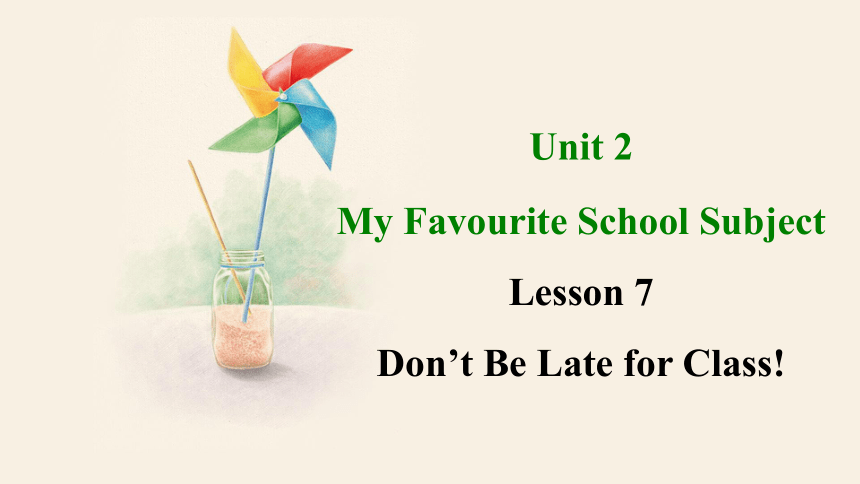
|
|
| 格式 | pptx | ||
| 文件大小 | 7.3MB | ||
| 资源类型 | 教案 | ||
| 版本资源 | 冀教版 | ||
| 科目 | 英语 | ||
| 更新时间 | 2023-12-16 15:41:41 | ||
图片预览

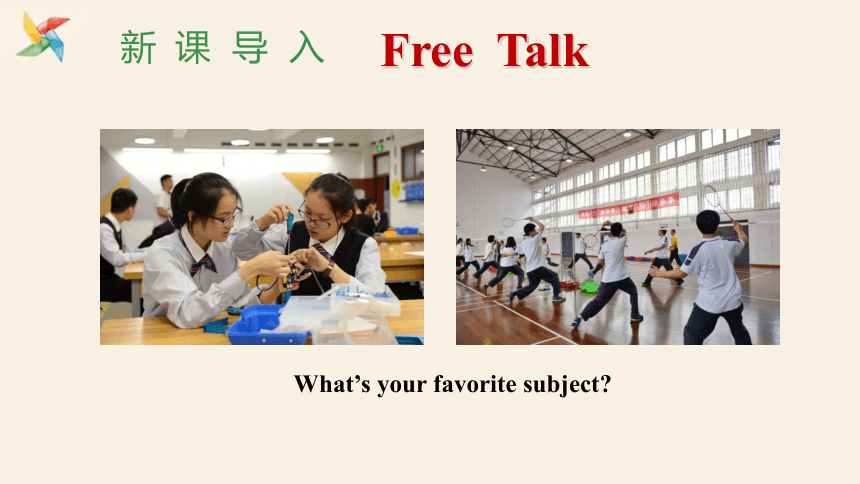

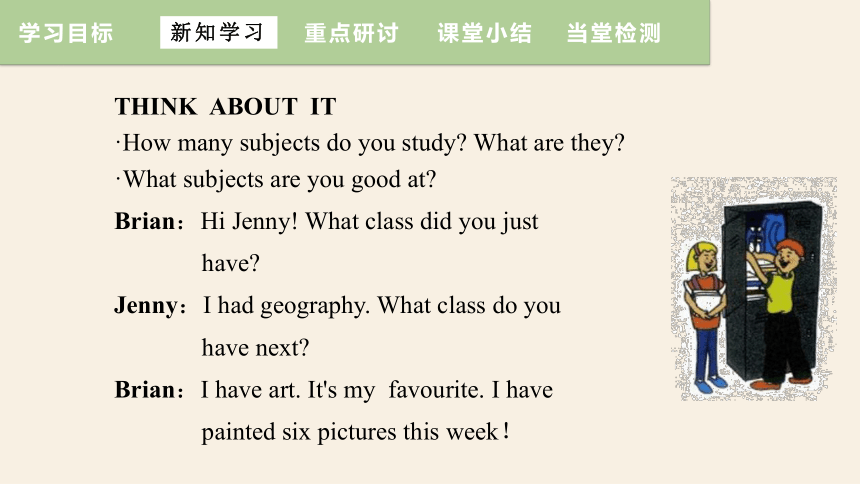

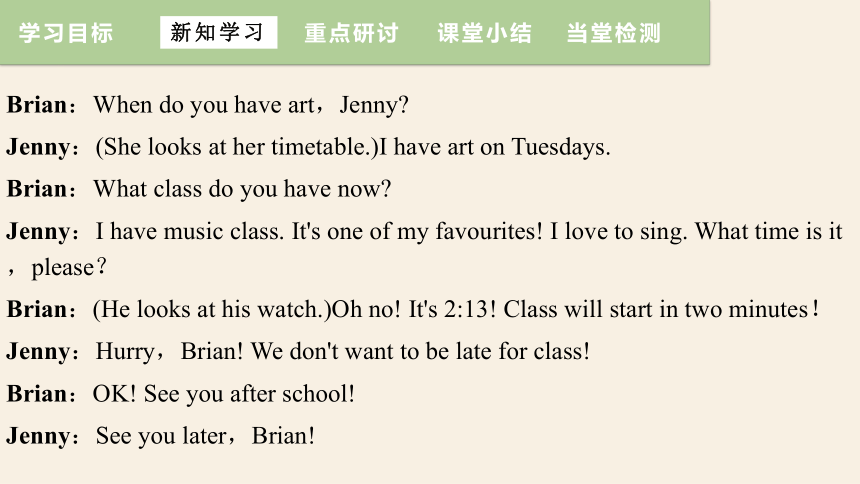
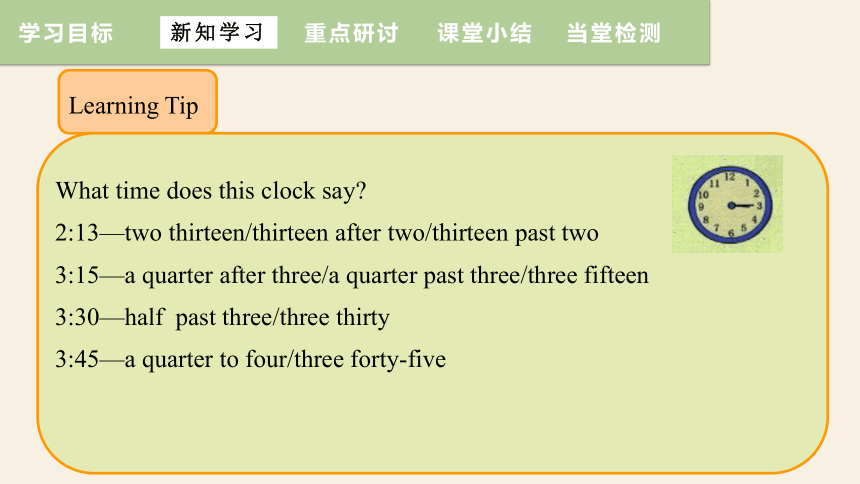
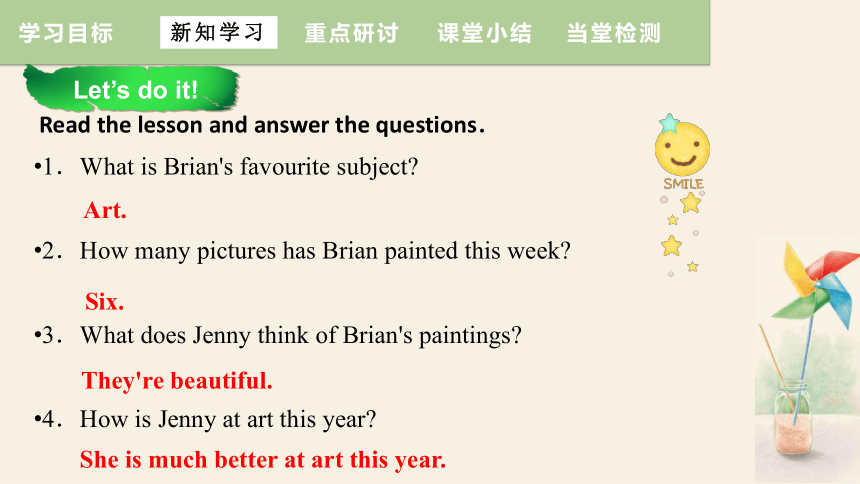
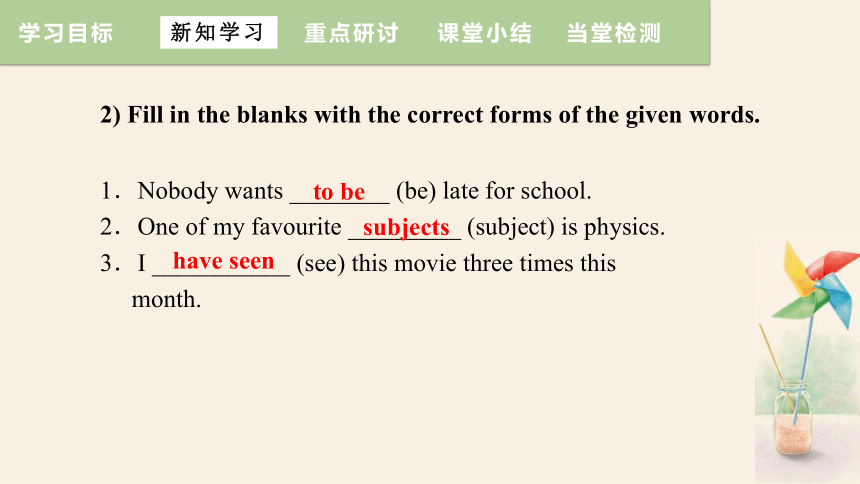
文档简介
(共29张PPT)
Unit 2
My Favourite School Subject
Lesson 7
Don’t Be Late for Class!
新
课
导
入
Free Talk
What’s your favorite subject
Language Goal
新知学习
课堂小结
当堂检测
学习目标
重点研讨
1.能熟悉并正确运用本课时的重点单词和短语
2.能够运用“My favourite subject is ...I like...best.”等句型谈论最喜欢的学科
3.能够运用“What’s the time It’s a quarter past/after/to three.”等句型谈论时间
新知学习
课堂小结
当堂检测
学习目标
重点研讨
THINK ABOUT IT
·How many subjects do you study What are they
·What subjects are you good at
Brian:Hi Jenny! What class did you just
have
Jenny:I had geography. What class do you
have next
Brian:I have art. It's my favourite. I have
painted six pictures this week!
新知学习
课堂小结
当堂检测
学习目标
重点研讨
Jenny:I hope to see them sometime. I have seen some of your paintings. They're beautiful! I like art too,but I'm not very good at it. I'm not going to be a painter in the future!
Brian:I've told you many times,Jenny. Art is fun for everyone. You don't need to be good at it.
Jenny:(She laughs.)You're right,Brian. Art is fun,and I like our art teacher. She has taught us a lot. I am much better at art this year.
新知学习
课堂小结
当堂检测
学习目标
重点研讨
Brian:When do you have art,Jenny
Jenny:(She looks at her timetable.)I have art on Tuesdays.
Brian:What class do you have now
Jenny:I have music class. It's one of my favourites! I love to sing. What time is it,please?
Brian:(He looks at his watch.)Oh no! It's 2:13! Class will start in two minutes!
Jenny:Hurry,Brian! We don't want to be late for class!
Brian:OK! See you after school!
Jenny:See you later,Brian!
新知学习
课堂小结
当堂检测
学习目标
重点研讨
Learning Tip
What time does this clock say
2:13—two thirteen/thirteen after two/thirteen past two
3:15—a quarter after three/a quarter past three/three fifteen
3:30—half past three/three thirty
3:45—a quarter to four/three forty-five
新知学习
课堂小结
当堂检测
学习目标
重点研讨
Let’s do it!
Read the lesson and answer the questions.
1.What is Brian's favourite subject
2.How many pictures has Brian painted this week
3.What does Jenny think of Brian's paintings
4.How is Jenny at art this year
Art.
Six.
They're beautiful.
She is much better at art this year.
新知学习
课堂小结
当堂检测
学习目标
重点研讨
2) Fill in the blanks with the correct forms of the given words.
1.Nobody wants ________ (be) late for school.
2.One of my favourite _________ (subject) is physics.
3.I ___________ (see) this movie three times this
month.
to be
subjects
have seen
新知学习
课堂小结
当堂检测
学习目标
重点研讨
3) Listen to the dialogue and match the people with their favourite subjects.
Jack Kathy Nick Tom
重点研讨
课堂小结
当堂检测
学习目标
新知学习
Kathy: Hi Jack, where are you going
Jack: To the museum. There is a show on Chinese culture. You know I like to study about China.
Kathy: I remember geography is your favourite subject.
Jack: Right. What’s your favourite subject, Kathy
Kathy: Art. I like drawing pictures. I spent three years learning to draw.
Jack: That’s a long time. Look, is that your brother Nick
听力材料
重点研讨
课堂小结
当堂检测
学习目标
新知学习
Kathy: Yeah. He’s two years older than me. He likes his music teacher a lot, and he thinks music is very interesting.
Jack: Really I’m not good at music.
Kathy: By the way, would you please help me with my maths
Jack: Ask Tom. Maths is his favourite subject, and he’s very good at it.
Kathy: Oh, that’s right. I forgot!
听力材料
重点研讨
课堂小结
当堂检测
学习目标
新知学习
4) Work in groups. Fill in your class timetable and discuss it with each other. Then present it to the whole class.
Task tips:How many classes are there What classes do you like and what classes don‘t you like Why or why not What’s your favourite class
Day Monday Tuesday Wedn esday Thurs day Friday
Time
重点研讨
课堂小结
当堂检测
学习目标
新知学习
be late for 迟到
1
be late for sth.意为“做某事迟到了/晚了”。 还可以用be late to do sth.来表达。
eg:Jack was late for class again yesterday.
杰克昨天上课又迟到了。
I was late to meet my uncle at the airport today.
今天我去机场接我叔叔晚了。
重点研讨
课堂小结
当堂检测
学习目标
新知学习
2
Don’t+动词原形+其他!意为“不要……!”
这是表建议“不要做……”的祈使句型。Don't后接动词原形。
eg:Don't go out at night!
晚上不要出去!
【重点】
重点研讨
课堂小结
当堂检测
学习目标
新知学习
be good at 意为“擅长”
3
be good at表示“擅长,(在某方面)做得好”。be better at 是be good at的比较级,表示“更擅长”。much可用于比较级前,用来加强语气和程度。
eg:She is good at maths. I am much better at
maths.她擅长数学,我比她更擅长数学。
重点研讨
课堂小结
当堂检测
学习目标
新知学习
辨析be good at,be good for与be good to
(1)be good at “擅长”, 后接名词、代词或动名词,可与do well in 相互转换。
eg: Mr. Brown is American, but he is good at Chinese
and Japanese.=
Mr. Brown is American, but he does well in Chinese and Japanese.
布朗先生是一个美国人,但是他擅长汉语和日语。
重点研讨
课堂小结
当堂检测
学习目标
新知学习
(2)be good for “对…有好处/有益”, 其反义短语为:
be bad for “对…有害处”。
eg:Eating more vegetables is good for your health.
多吃蔬菜对你的健康有好处。
(3)be good to “对……友好”, 后接名词或代词。
eg: The old man is very good to his neighbours.
那位老人对他的邻居非常友好。
重点研讨
课堂小结
当堂检测
学习目标
新知学习
4
need vt. 需要; 必须 aux. 必须; 不得不
need作实义动词时的用法
(1)need作实义动词,意为“需要;必须”, need后面的宾语可以是名词、动名词、动词不定式或代词。
eg:The children in the poor mountain are as need a great deal of money.
贫困山区的孩子们需要大量的钱。
The boy doesn't have a pen to write with, so he needs
one to finish his homework.
那个男孩没有钢笔写字,因此他需要一支笔来完成他的作业。
重点研讨
课堂小结
当堂检测
学习目标
新知学习
(2)后面需要接带to的动词不定式,表示有义务或者责任去做某事。
eg:Linda needs to take care of her grandfather in the
hospital.琳达需要在医院照顾她的爷爷。
You need to show your passport to the policeman.
你需要把你的护照给那个警察看。
(3)既可用于肯定句,也可用于否定句和疑问句,构成否定句和疑问句时要借助助动词do 或者does。
eg: Mary doesn't need any help. 玛丽不需要任何帮助。
Does Henry need to buy a computer 亨利需要买一台电脑吗?
重点研讨
课堂小结
当堂检测
学习目标
新知学习
need作情态动词时的用法
need 作情态动词时,一般不用于肯定句。用于否定句时,直接在need后加上not(缩写形式为needn't);变为疑问句时,将need 移到主语前。
eg:We needn't clean the classroom after school.
我们放学后不必打扫教室。
Need I copy all the new words in the textbook?
我需要抄写课本里所有的生词吗?
重点研讨
课堂小结
当堂检测
学习目标
新知学习
(2)用于回答情态动词must所提问的问句。
eg:—Must Susan return the book to the library this afternoon? 今天下午苏珊必须把书还给图书馆吗?
—No, she needn't.不,她不必。
拓展
need doing 是主动形式表被动,等于 need to be done,意为“某事/物需要被做”。
The flowers need watering. (=The flowers need to be watered.) 花儿需要浇水。
重点研讨
课堂小结
当堂检测
学习目标
新知学习
need一词本领高,三种词性都代表;
实义动词表“需要”,名、代、to do后面靠;
need 后接动名词,主动形式表被动;
情态动词表“需要”,人称和数不用找;
其后直接用动词,疑问、否定多用到;
名词need 表“需要”,较之动词用得少;
要想need用得好,一定谨慎多用脑。
魔法记忆
重点研讨
课堂小结
当堂检测
学习目标
新知学习
5
much better 好多了
形容词比较级前用much修饰,意为“……得多”。修饰比较级的常用单词和短语还有far,a lot,a little,a bit等。
eg:I think fish is much more delicious than
pork.我认为鱼肉比猪肉好吃得多。
【难点】
重点研讨
课堂小结
当堂检测
学习目标
新知学习
6
in two minutes 两分钟之后
in+时间段,常用于将来时。
eg:He will come here in 5 minutes.
他将在5分钟后来这里。
重点研讨
课堂小结
当堂检测
学习目标
新知学习
7
half /hɑ f/ n.一半
half为可数名词,其复数形式为halves。
eg:Let's cut the cake into halves.
咱们把蛋糕切成两半吧。
表示“一半……”时,用half a(n)...;表示“一个半……”时,要用one+可数名词单数+and a half或one and a half+可数名词复数。
eg:half an apple 半个苹果 one banana and a half
一根半香蕉 one and a half pears 一个半梨子
课堂小结
重点研讨
当堂检测
学习目标
新知学习
重点单词:argue, stop, want, copy, surprise, lend, both等。
重点短语:two peas in a pod, a few, 时间段+ later,
at the end of, come over , feel awful/ bad/
embarrassed等。
重点句式:sb. + spend + 时间/金钱+ (in) doing sth.。
Unit 2
Lesson 7
当堂检测
重点研讨
课堂小结
学习目标
新知学习
根据句意及首字母或汉语提示填空
1.You can't a______ with her because she is a child.
2.Nobody wants to have ________(敌人).
3.Tony's father and uncle are _____(两者都)policemen.
They help keep the city safe.
4.To our s________,the disabled(残疾的)boy won the first prize in the 100 metre race.
5.He ________(抄写)the text into a notebook.
rgue
enemies
both
urprise
copied
当堂检测
重点研讨
课堂小结
学习目标
新知学习
根据句意及汉语提示完成句子
1._______ ______ ______(三天后),there was a football match.
2.People should _____ ______ ________(互相帮助).
3.Can you ________ _______(过来)and join us?
4.They all _______ _____(伸出)their hands to welcome me.
5.They ______ ______ ________(达成协议) at last.
Three days later
help each other
come over
hold out
made a deal
Unit 2
My Favourite School Subject
Lesson 7
Don’t Be Late for Class!
新
课
导
入
Free Talk
What’s your favorite subject
Language Goal
新知学习
课堂小结
当堂检测
学习目标
重点研讨
1.能熟悉并正确运用本课时的重点单词和短语
2.能够运用“My favourite subject is ...I like...best.”等句型谈论最喜欢的学科
3.能够运用“What’s the time It’s a quarter past/after/to three.”等句型谈论时间
新知学习
课堂小结
当堂检测
学习目标
重点研讨
THINK ABOUT IT
·How many subjects do you study What are they
·What subjects are you good at
Brian:Hi Jenny! What class did you just
have
Jenny:I had geography. What class do you
have next
Brian:I have art. It's my favourite. I have
painted six pictures this week!
新知学习
课堂小结
当堂检测
学习目标
重点研讨
Jenny:I hope to see them sometime. I have seen some of your paintings. They're beautiful! I like art too,but I'm not very good at it. I'm not going to be a painter in the future!
Brian:I've told you many times,Jenny. Art is fun for everyone. You don't need to be good at it.
Jenny:(She laughs.)You're right,Brian. Art is fun,and I like our art teacher. She has taught us a lot. I am much better at art this year.
新知学习
课堂小结
当堂检测
学习目标
重点研讨
Brian:When do you have art,Jenny
Jenny:(She looks at her timetable.)I have art on Tuesdays.
Brian:What class do you have now
Jenny:I have music class. It's one of my favourites! I love to sing. What time is it,please?
Brian:(He looks at his watch.)Oh no! It's 2:13! Class will start in two minutes!
Jenny:Hurry,Brian! We don't want to be late for class!
Brian:OK! See you after school!
Jenny:See you later,Brian!
新知学习
课堂小结
当堂检测
学习目标
重点研讨
Learning Tip
What time does this clock say
2:13—two thirteen/thirteen after two/thirteen past two
3:15—a quarter after three/a quarter past three/three fifteen
3:30—half past three/three thirty
3:45—a quarter to four/three forty-five
新知学习
课堂小结
当堂检测
学习目标
重点研讨
Let’s do it!
Read the lesson and answer the questions.
1.What is Brian's favourite subject
2.How many pictures has Brian painted this week
3.What does Jenny think of Brian's paintings
4.How is Jenny at art this year
Art.
Six.
They're beautiful.
She is much better at art this year.
新知学习
课堂小结
当堂检测
学习目标
重点研讨
2) Fill in the blanks with the correct forms of the given words.
1.Nobody wants ________ (be) late for school.
2.One of my favourite _________ (subject) is physics.
3.I ___________ (see) this movie three times this
month.
to be
subjects
have seen
新知学习
课堂小结
当堂检测
学习目标
重点研讨
3) Listen to the dialogue and match the people with their favourite subjects.
Jack Kathy Nick Tom
重点研讨
课堂小结
当堂检测
学习目标
新知学习
Kathy: Hi Jack, where are you going
Jack: To the museum. There is a show on Chinese culture. You know I like to study about China.
Kathy: I remember geography is your favourite subject.
Jack: Right. What’s your favourite subject, Kathy
Kathy: Art. I like drawing pictures. I spent three years learning to draw.
Jack: That’s a long time. Look, is that your brother Nick
听力材料
重点研讨
课堂小结
当堂检测
学习目标
新知学习
Kathy: Yeah. He’s two years older than me. He likes his music teacher a lot, and he thinks music is very interesting.
Jack: Really I’m not good at music.
Kathy: By the way, would you please help me with my maths
Jack: Ask Tom. Maths is his favourite subject, and he’s very good at it.
Kathy: Oh, that’s right. I forgot!
听力材料
重点研讨
课堂小结
当堂检测
学习目标
新知学习
4) Work in groups. Fill in your class timetable and discuss it with each other. Then present it to the whole class.
Task tips:How many classes are there What classes do you like and what classes don‘t you like Why or why not What’s your favourite class
Day Monday Tuesday Wedn esday Thurs day Friday
Time
重点研讨
课堂小结
当堂检测
学习目标
新知学习
be late for 迟到
1
be late for sth.意为“做某事迟到了/晚了”。 还可以用be late to do sth.来表达。
eg:Jack was late for class again yesterday.
杰克昨天上课又迟到了。
I was late to meet my uncle at the airport today.
今天我去机场接我叔叔晚了。
重点研讨
课堂小结
当堂检测
学习目标
新知学习
2
Don’t+动词原形+其他!意为“不要……!”
这是表建议“不要做……”的祈使句型。Don't后接动词原形。
eg:Don't go out at night!
晚上不要出去!
【重点】
重点研讨
课堂小结
当堂检测
学习目标
新知学习
be good at 意为“擅长”
3
be good at表示“擅长,(在某方面)做得好”。be better at 是be good at的比较级,表示“更擅长”。much可用于比较级前,用来加强语气和程度。
eg:She is good at maths. I am much better at
maths.她擅长数学,我比她更擅长数学。
重点研讨
课堂小结
当堂检测
学习目标
新知学习
辨析be good at,be good for与be good to
(1)be good at “擅长”, 后接名词、代词或动名词,可与do well in 相互转换。
eg: Mr. Brown is American, but he is good at Chinese
and Japanese.=
Mr. Brown is American, but he does well in Chinese and Japanese.
布朗先生是一个美国人,但是他擅长汉语和日语。
重点研讨
课堂小结
当堂检测
学习目标
新知学习
(2)be good for “对…有好处/有益”, 其反义短语为:
be bad for “对…有害处”。
eg:Eating more vegetables is good for your health.
多吃蔬菜对你的健康有好处。
(3)be good to “对……友好”, 后接名词或代词。
eg: The old man is very good to his neighbours.
那位老人对他的邻居非常友好。
重点研讨
课堂小结
当堂检测
学习目标
新知学习
4
need vt. 需要; 必须 aux. 必须; 不得不
need作实义动词时的用法
(1)need作实义动词,意为“需要;必须”, need后面的宾语可以是名词、动名词、动词不定式或代词。
eg:The children in the poor mountain are as need a great deal of money.
贫困山区的孩子们需要大量的钱。
The boy doesn't have a pen to write with, so he needs
one to finish his homework.
那个男孩没有钢笔写字,因此他需要一支笔来完成他的作业。
重点研讨
课堂小结
当堂检测
学习目标
新知学习
(2)后面需要接带to的动词不定式,表示有义务或者责任去做某事。
eg:Linda needs to take care of her grandfather in the
hospital.琳达需要在医院照顾她的爷爷。
You need to show your passport to the policeman.
你需要把你的护照给那个警察看。
(3)既可用于肯定句,也可用于否定句和疑问句,构成否定句和疑问句时要借助助动词do 或者does。
eg: Mary doesn't need any help. 玛丽不需要任何帮助。
Does Henry need to buy a computer 亨利需要买一台电脑吗?
重点研讨
课堂小结
当堂检测
学习目标
新知学习
need作情态动词时的用法
need 作情态动词时,一般不用于肯定句。用于否定句时,直接在need后加上not(缩写形式为needn't);变为疑问句时,将need 移到主语前。
eg:We needn't clean the classroom after school.
我们放学后不必打扫教室。
Need I copy all the new words in the textbook?
我需要抄写课本里所有的生词吗?
重点研讨
课堂小结
当堂检测
学习目标
新知学习
(2)用于回答情态动词must所提问的问句。
eg:—Must Susan return the book to the library this afternoon? 今天下午苏珊必须把书还给图书馆吗?
—No, she needn't.不,她不必。
拓展
need doing 是主动形式表被动,等于 need to be done,意为“某事/物需要被做”。
The flowers need watering. (=The flowers need to be watered.) 花儿需要浇水。
重点研讨
课堂小结
当堂检测
学习目标
新知学习
need一词本领高,三种词性都代表;
实义动词表“需要”,名、代、to do后面靠;
need 后接动名词,主动形式表被动;
情态动词表“需要”,人称和数不用找;
其后直接用动词,疑问、否定多用到;
名词need 表“需要”,较之动词用得少;
要想need用得好,一定谨慎多用脑。
魔法记忆
重点研讨
课堂小结
当堂检测
学习目标
新知学习
5
much better 好多了
形容词比较级前用much修饰,意为“……得多”。修饰比较级的常用单词和短语还有far,a lot,a little,a bit等。
eg:I think fish is much more delicious than
pork.我认为鱼肉比猪肉好吃得多。
【难点】
重点研讨
课堂小结
当堂检测
学习目标
新知学习
6
in two minutes 两分钟之后
in+时间段,常用于将来时。
eg:He will come here in 5 minutes.
他将在5分钟后来这里。
重点研讨
课堂小结
当堂检测
学习目标
新知学习
7
half /hɑ f/ n.一半
half为可数名词,其复数形式为halves。
eg:Let's cut the cake into halves.
咱们把蛋糕切成两半吧。
表示“一半……”时,用half a(n)...;表示“一个半……”时,要用one+可数名词单数+and a half或one and a half+可数名词复数。
eg:half an apple 半个苹果 one banana and a half
一根半香蕉 one and a half pears 一个半梨子
课堂小结
重点研讨
当堂检测
学习目标
新知学习
重点单词:argue, stop, want, copy, surprise, lend, both等。
重点短语:two peas in a pod, a few, 时间段+ later,
at the end of, come over , feel awful/ bad/
embarrassed等。
重点句式:sb. + spend + 时间/金钱+ (in) doing sth.。
Unit 2
Lesson 7
当堂检测
重点研讨
课堂小结
学习目标
新知学习
根据句意及首字母或汉语提示填空
1.You can't a______ with her because she is a child.
2.Nobody wants to have ________(敌人).
3.Tony's father and uncle are _____(两者都)policemen.
They help keep the city safe.
4.To our s________,the disabled(残疾的)boy won the first prize in the 100 metre race.
5.He ________(抄写)the text into a notebook.
rgue
enemies
both
urprise
copied
当堂检测
重点研讨
课堂小结
学习目标
新知学习
根据句意及汉语提示完成句子
1._______ ______ ______(三天后),there was a football match.
2.People should _____ ______ ________(互相帮助).
3.Can you ________ _______(过来)and join us?
4.They all _______ _____(伸出)their hands to welcome me.
5.They ______ ______ ________(达成协议) at last.
Three days later
help each other
come over
hold out
made a deal
同课章节目录
- Unit 1 Me and My Class
- Lesson 1 Back to School!
- Lesson 2 Many Faces, One Picture
- Lesson 3 Getting to Know You!
- Lesson 4 Best Friends
- Lesson 5 Meet Ms. Liu
- Lesson 6 Jenny's Week
- Unit 2 My Favourite School Subject
- Lesson 7 Don't Be Late for Class!
- Lesson 8 E-mail Helpers!
- Lesson 9 I Don't Want to Miss Geography !
- Lesson 10 Looking for Lisa
- Lesson 11 Lily Learns about China !
- Lesson 12 Karen's Hair Stood Up!
- Unit Review
- Unit 3 Families Celebrate Togethe
- Lesson 13 I Love Autumn
- Lesson 14 Happy Memories
- Lesson 15 A Present for Li Ming!
- Lesson 16 Happy Thanksgiving!
- Lesson 17 Presents from Canada!
- Lesson 18 Li Ming's Birthday
- Unit Review
- Unit 4 My Neighbourhood
- Lesson 19 The Best Neighourhood
- Lesson 20 No Stopping!
- Lesson 21 Eat a Donut and Turn Right
- Lesson 22 I Like My Neighbourhood
- Lesson 23 People in My Neighbourhood
- Lesson 24 I Need a Map!
- Unit Review
- Unit 5 My Future
- Lesson 25 I Want to Be a Teacher!
- Lesson 26 What Will I Be ?
- Lesson 27 What's Your Advice?
- Lesson 28 Rich or Poor? It Doesn't Matter!
- Lesson 29 Our Ambitions and Dreams
- Lesson 30 A Famous Friend?
- Unit Review
- Unit 6 Go With Transportation !
- Lesson 31 How Do You Travel ?
- Lesson 32 Trains Go Faster !
- Lesson 33 Life on Wheels
- Lesson 34 Flying Donuts
- Lesson 35 Future Transportation
- Lesson 36 Clean Cars ?
- Unit Review
- Unit 7 Enjoy Your Hobby
- Lesson 37 What's Your Hobby ?
- Lesson 38 Hobbies Are Fun!
- Lesson 39 Danny's Hobby
- Lesson 40 What's Paul's Hobby?
- Lesson 41 Show and Tell!
- Lesson 42 The New Club
- Unit Review
- Unit 8 Celebrating Me
- Lesson 43 What Makes You Unique?
- Lesson 44 Georgia Plays Basketball
- Lesson 45 Be Yourself !
- Lesson 46 My Dream
- Lesson 47 I Made It !
- Lesson 48 Li Ming's Report
- Unit Review
